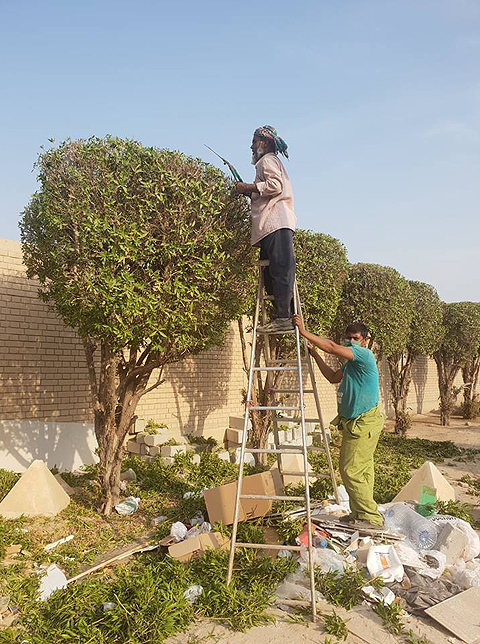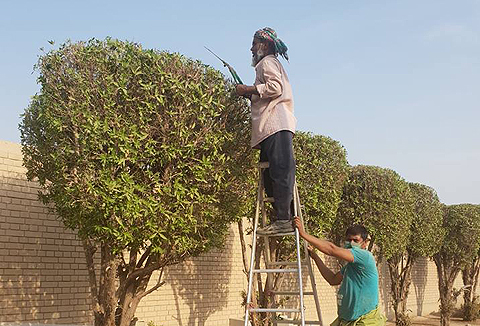 Ameen and Abu Khair trim a tree.
Ameen and Abu Khair trim a tree.Kuwait relies heavily on cleaners and menial labor from Bangladesh and other Asian countries. Thousands of them work the streets of Kuwait. But most take only a small salary and work extra jobs on the side to supplement their income. Kuwait Times met Ameen Motlib from Faridpur, a suburb of Dhaka. He works as a street sweeper and shrub and tree cutter in Kuwait. There are regular cutting and trimming schedules for all gardens and parks in Kuwait. "I am in charge of cutting and trimming bushes on Shuwaikh's streets and gardens. We not only trim, but are also in charge of switching on and off water supply to the plants," he said.
People in charge of cutting and trimming bushes around Kuwait say they cut and trim grasses once every 2-3 months. Cutting or trimming plants in your backyard is the most relaxing thing to do for some. This of course applies if you have a backyard with plants in Kuwait. Some psychologists recommend cutting or trimming trees/grasses when you want to relax or de-stress from a long day at work.
In summer, Ameen wakes up at 3 am and starts his job in Shuwaikh from 4 am, and is back at his accommodation by noon. They are taken by bus at 3:45 am and reach their assigned area by 4 am. "My uncle and five fellow Bangladeshis work with me to clean and clear three long streets assigned to us in Shuwaikh," he said. As soon as they are dropped at their designated area, his group starts work immediately to finish as soon as possible. Ameen admits to doing the job speedily to avoid the harsh midday heat. "The instruction from our supervisor is to clean the area quickly so we can take rest when the sun is up. If needed, we trim the plants too," he said.
Kuwait bans outdoor work from 11 am to 4 pm from June 1 until Aug 31. "All outdoor work must be completed by 11 am, so we wind down by 10 am and start gathering under the shade of trees nearby. We talk, share experiences and call our families. We also eat and drink while the truck collects garbage bags from where we left them on the streets. Normally, we bring drinking water in containers," he said. By noon, Ameen's day concludes and the transport bus returns to take them back to their accommodation. Timings during winter and autumn are from 5 am to 1 pm.
Despite being only 30, Ameen has a 14-year-old son and a 3-year-old daughter. "I got married when I was 15. Life in Bangladesh is hard, but if you want to make it easy, get married," he quipped. "When I was 15, I decided to get married to my childhood sweetheart. I asked her parents' permission and my parents allowed us to get married, so we started life as husband and wife in Faridpur. But I realized life was still hard when my first child was born, when I was 16," he said.
He worked as a carpenter, but the money he earned from making tables and chairs was not enough for the family. "So I told my wife I should go abroad - it was hard for her, but eventually she agreed. So I looked for an agent and paid around KD 500. The next month I found myself in Kuwait," Ameen recalled. He arrived in Kuwait in 2005 with his uncle Abu Khair. His uncle was 40 and he was 18. "We were hired as cleaners and we signed a contract to receive KD 40 monthly, which was later increased to KD 60. In my spare time I clean cars so I can earn extra cash. This is my life and that of my uncle from then till now," he said.
Harsh challenges, good people
As street cleaners, they have no choice but to deal with the harsh weather, and bad and good people too. "We were not used to this unforgiving weather at first, but we've managed somehow. Of course, when it's really hot, you'll see us resting under the trees, but some people shout at us and tell us to get to work. There are good people too. Sometimes, if we are lucky enough, people give us KD 5 or even KD 10, but usually it's 250 fils," Ameen said.
"We also have to rest because we work under the heat of the summer sun and the cold in winter. These are the challenges we face and we are already used to them," he told Kuwait Times. The cut branches and leaves are collected by trucks and delivered to farms. Refuse like paper and plastic are separated for recycling purposes, while other trash is directly sent to the landfill.
By Ben Garcia











